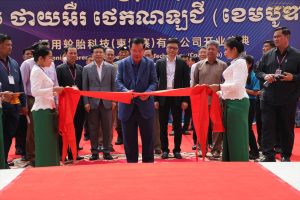A week after Cambodian authorities barred the country’s main opposition party from taking part in national elections in July, Cambodia’s Prime Minister Hun Sen again criticized Western diplomats and accused them of supporting detained opposition leader Kem Sokha.
The former leader of the banned Cambodia National Rescue Party (CNRP) has been ensnared in politically confected legal troubles since his arrest in September 2017 on charges of treason. In March of this year, after a drawn-out trial and long spell in a high-security prison, he was finally sentenced to 27 years in prison.
In a speech at the inauguration of a tire factory in Sihanoukville yesterday, Hun Sen lashed out at the “backstabbing” diplomats who he accused of secretly supporting Sokha.
“I was about to ask the King and the court to pardon and release Sokha, but I could not do so because of some untrustworthy foreign diplomats who always shake my hands but meet and invite Sokha to visit their embassies secretly,” the Cambodian leader said, according to the government-aligned Khmer Times. “I do not trust diplomats who insult me or the sovereignty of the country.”
Hun Sen appears to have taken particular umbrage at Western ambassadors’ frequent visits to Kem Sokha’s Phnom Penh home during his long period of house arrest. Perhaps the highest-profile caller was U.S. Deputy Secretary of State Wendy Sherman, who visited Kem Sokha during her June 2021 trip to the country. Western governments, particularly the United States, were also harshly critical of the charges and verdict against Sokha, with Ambassador W. Patrick Murphy describing them at the time as “fabricated conspiracy theories.”
Yesterday’s speech also came a week after Cambodia’s National Election Committee (NEC) rejected the application of the Candlelight Party (CLP) to take part in the national elections on July 23. The decision to bar the party, on the flimsy grounds that it failed to attach a notarized copy of the party’s registration document with its application, ensures that Hun Sen’s Cambodian People’s Party will win the majority, if not all of the 125 seats in the National Assembly, as it did in 2018. The NEC’s decision, predictably, prompted the release of pro forma statements of concern from Western embassies.
In yesterday’s speech, the 70-year-old leader, who has been in power in one form or another since 1985, called on Western governments not to criticize the conduct of the July 23 national election. “From now until the election, please be silent, let us use domestic rules to solve the problem of democracy in Cambodia,” he said.
Allegations of foreign interference have long occupied a privileged place in Hun Sen’s rhetorical arsenal. Since the United Nations peacekeeping mission of the early 1990s, Hun Sen has viewed Western democracy promotion efforts less as a form of good-faith advocacy than as an attempt actively to interfere in Cambodian politics and weaken the CPP’s hold on power. This, in turn, has been used as a pretext to crack down on opposition parties and civil society groups.
For instance, the treason allegation against Kem Sokha centers on comments he made to an audience in Australia in 2013. In a video of the speech, a selectively edited version of which was released by the government following his arrest, he references the support he had received from Western democracy promotion advocates, and compared Cambodia to Serbia prior to the fall of Slobodan Milosevic in 2000.
That has led Hun Sen’s government to view any Western interaction with opposition figures as itself a hostile and oppositional act. As Hun Sen informed Western countries in an April speech, “You have to choose between an individual group that breaks the laws and the government. Please choose one. If you need those who were penalized by law, please do so, and you can then break diplomatic relations from Cambodia.”
In response, the U.S. Embassy in Phnom Penh announced that it doesn’t “support any particular individual, institution, or political party” in Cambodia, and merely wanted the country to have “an inclusive, multi-party democracy.”
The CPP’s claim about foreign interference is spun around a kernel of truth. Cambodian opposition figures have long solicited Western support and pressure, and sought to deploy these in their struggles against Hun Sen’s authoritarian government. As a result, in Cambodian domestic politics the advocacy of democracy has always been hard to distinguish from opposition to the CPP. This hasn’t been helped by the actions of some democracy promotion advocates, most notably the U.S.-funded International Republican Institute, which for a period in the late 1990s and early 2000s openly supported the opposition Sam Rainsy Party, the predecessor of the CLP.
But the views of Hun Sen and his party on this matter have much deeper roots, stemming from their abiding resentment at older Western policies toward Cambodia, compounded by the brute imperatives of political survival. Indeed, the fact that Cambodia’s leader feels the need to call out Western diplomats at a time when his party faces next to no political opposition and is set to win another clean sweep at the upcoming election, backstopped by Chinese diplomatic support, speaks to the depth of this resentment and paranoia.
































